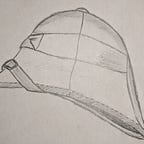Think: Doubt
There is a distinct difference between building a new belief where none previously existed and doing the work of deconstructing and examining an existing belief so that it can be corrected.
The existing belief has energy poured into it. Some have tied them to the memory of a dead loved one and changing it means betraying them in some way. Others have made it so much a part of their identity that altering it means an embarrassment they are unwilling to endure. Many remain blind to their bad belief because they are never able to dissolve the fog of emotion that blocks them from seeing it honestly.
Much simpler is the task of the young. As they enter adolescence the lights in their frontal lobes are turned on. They start testing their new brain powers against adults in arguments, kicking the walls of the expectations adults have for their good behavior.
Along with this, they start considering things outside themselves. I’m hungry, I want to stay up late, That’s mine, I, and me begin to evolve into questions about how to navigate relationships of all sorts. The concept of fairness that they held a few years earlier dealt with wanting a fudge pop because their sister got one. Now, it’s about injustices in the world around them.
An 18-year-old’s efforts to build their new beliefs carries the hazards of inexperience, but the work is much easier than…
